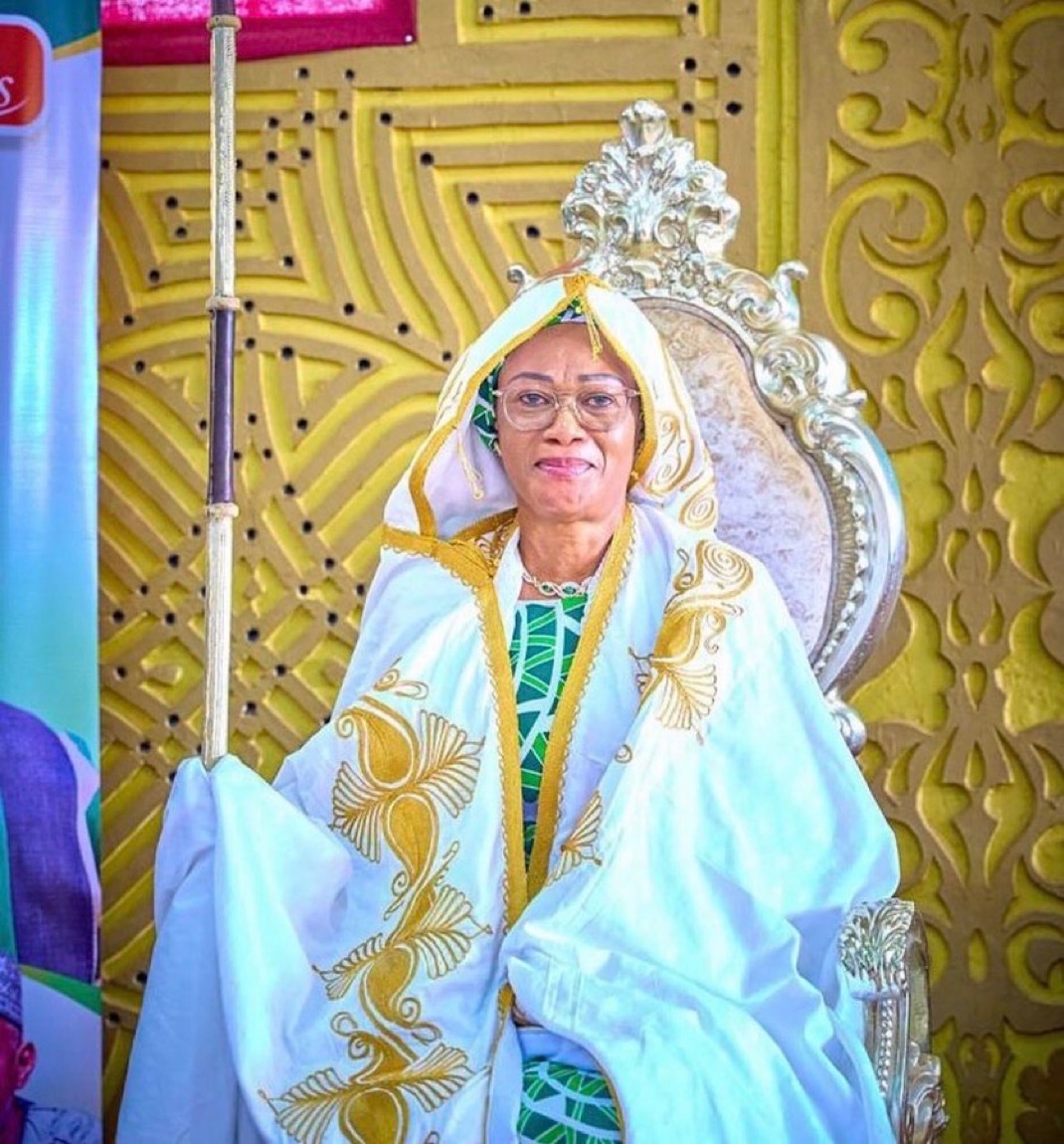
Oluremi Tinubu Honored as Sarauniyar Yaki, Queen Warrior of Akko Emirate in Gombe State

In a ceremony steeped in history, culture, and symbolism, Nigeria’s First Lady, Senator Oluremi Tinubu, has been conferred with the revered traditional title of Sarauniyar Yaki—translated as the Queen Warrior—of Akko Emirate in Gombe State. The momentous occasion not only highlighted the intertwining of political authority and traditional institutions in Nigeria but also underscored the growing recognition of women who have carved their names into the fabric of leadership across the nation. The conferment ceremony drew the attention of political figures, traditional rulers, cultural enthusiasts, and the general public, sparking conversations about the role of women in leadership and the preservation of Nigeria’s cultural heritage.
The Emir of Akko, His Royal Highness Alhaji Umar Atiku, bestowed the honor on the First Lady in a colorful event that showcased the rich cultural diversity of Gombe State. Dignitaries, community leaders, women’s groups, and youth associations gathered at the palace grounds where the event unfolded in an atmosphere of jubilation. Traditional drummers, dancers, and singers provided a rhythmic backdrop to the proceedings, while colorfully adorned horsemen rode with pride, a signature of northern Nigerian ceremonies that symbolize power and bravery. It was within this vibrant display of heritage that Oluremi Tinubu was officially installed as the Queen Warrior of the Akko Emirate, an honor rarely conferred on women, particularly those who hail from outside the region.
For many, the conferment speaks volumes about the First Lady’s reputation, influence, and impact across Nigeria. Known not only as the wife of President Bola Ahmed Tinubu but also as a three-term senator who made her mark in the Nigerian political landscape, Oluremi Tinubu has long been recognized as a woman of resilience and commitment. Her work in areas of social development, education, and women empowerment has been well documented, and the Akko Emirate’s decision to confer such a prestigious title on her is being interpreted as both an acknowledgment of her personal contributions and a symbol of inclusivity that cuts across ethnic, regional, and cultural divides.
The title Sarauniyar Yaki is one that carries profound historical weight. In northern Nigerian tradition, it denotes a warrior queen, a title reserved for women whose leadership and courage embody the spirit of resilience, bravery, and defense of the people. By granting this honor to the First Lady, the Emirate has not only bestowed cultural prestige but also aligned her identity with the historical legacy of warrior women who played strategic roles in protecting communities and guiding them through turbulent times. For Oluremi Tinubu, whose influence has largely been seen through the lenses of politics, philanthropy, and advocacy, this new recognition positions her within a different cultural narrative—one that ties her to heritage and valor.
The event also carried strong political undertones. With Nigeria navigating multiple challenges including economic reforms, security concerns, and social welfare demands, the conferment of such a title on the First Lady appears to send a message of solidarity and unity. The Akko Emirate, located in Gombe State in the northeastern region of Nigeria, has its own history of resilience amidst broader regional struggles, particularly with the impact of insecurity in the northeast. Bestowing the title of Queen Warrior on the First Lady can be seen as a symbolic gesture that affirms her as a rallying figure for women and communities in the region, strengthening ties between the presidency and traditional institutions in Nigeria.
In her acceptance speech, Oluremi Tinubu expressed deep gratitude to the Emir of Akko and the people of Gombe State, promising to uphold the values represented by the title and to continue advocating for initiatives that uplift women, children, and vulnerable communities. She highlighted the importance of traditional institutions in maintaining Nigeria’s cultural identity and fostering peace and unity across the diverse nation. Her words resonated with many in attendance, particularly women and youth groups who view her as a symbol of possibility in a male-dominated political and cultural landscape.
The conferment ceremony further sparked reactions on social media, with many Nigerians celebrating the honor while others debated its implications. Admirers described it as a well-deserved recognition for the First Lady’s contributions, pointing to her decades-long career in public service and her initiatives targeted at empowering women and improving access to education. Some also noted that the honor reinforces the relevance of traditional titles in modern governance, reminding citizens of the cultural bedrock upon which Nigeria is built. Critics, however, questioned whether such titles should be conferred on political figures, warning that traditional institutions risk being overshadowed by political interests. Nonetheless, the buzz surrounding the event only reinforced the significance of the moment in Nigeria’s socio-political landscape.
For the Akko Emirate, this event was more than a ceremonial gesture—it was a reaffirmation of its place in Nigeria’s tapestry of cultural influence. Located in the heart of Gombe State, Akko holds historical importance and is regarded as one of the influential emirates in the northeast. By extending such an honor to the First Lady, the Emirate has not only aligned itself with the national leadership but also elevated its cultural prominence on the national stage.
Observers also pointed out the gender symbolism of the title. In a society where traditional leadership and warrior roles have historically been associated with men, the choice to crown Oluremi Tinubu as Sarauniyar Yaki challenges old perceptions and underscores the evolving recognition of women in positions of power and authority. This is particularly poignant in northern Nigeria, where cultural expectations often limit women’s visibility in leadership spaces. For young women and girls in Gombe State and beyond, seeing the First Lady crowned as a warrior queen could serve as both inspiration and affirmation that leadership is not bound by gender.
As the ceremony came to a close, the First Lady was adorned with traditional regalia symbolic of her new status, including a richly embroidered gown and a turban befitting her position. The jubilant crowd erupted in chants and applause, sealing the moment as one of both cultural pride and national significance. From the colorful display of northern heritage to the powerful symbolism of a woman receiving one of the Emirate’s most prestigious titles, the conferment of Sarauniyar Yaki on Oluremi Tinubu was a reminder that traditional honors in Nigeria remain a potent force, bridging history with contemporary realities.
In the days and weeks ahead, the significance of this honor will likely continue to reverberate across political and cultural spaces in Nigeria. It adds a new dimension to the First Lady’s profile, weaving her identity into the storied traditions of northern Nigeria and situating her as not only a political figure but also a custodian of cultural honor. Whether interpreted as a symbol of unity, recognition, or political alignment, the conferment of the title Sarauniyar Yaki on Oluremi Tinubu will remain etched in history as a landmark moment that blended tradition, gender empowerment, and national identity in one unforgettable event.

